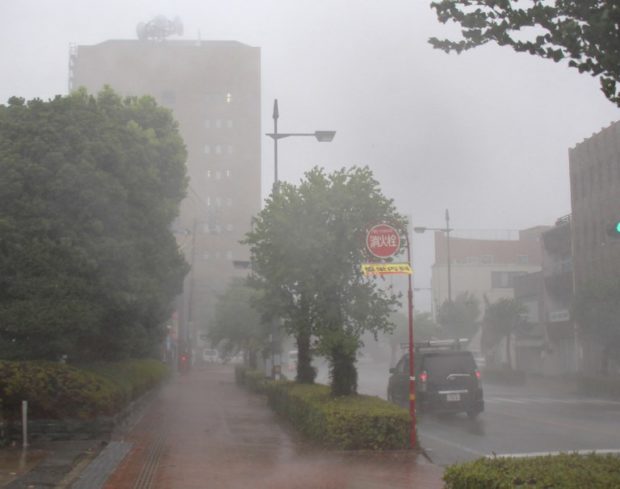Strongest typhoon in quarter century hits Japan

Heavy rain and winds caused by Typhoon Jebi hit the city of Tokushima in Tokushima prefecture on September 4, 2018. AFP
TOKYO, Japan — The strongest typhoon to hit Japan in 25 years made landfall Tuesday, with more than a million people urged to evacuate to escape violent winds and heavy rainfall.
Typhoon Jebi, with winds of up to 216 kilometers (135 miles) per hour, made landfall around midday in southwestern Japan near areas still recovering from deadly record rain earlier this summer.
It was moving fast on a northeast track, reaching the city of Kobe by early afternoon.
More than 700 flights were cancelled, including several international flights departing and arriving at Nagoya and Osaka, along with ferries, local train services and some bullet train lines.
Prime Minister Shinzo Abe urged people to evacuate early and ordered his government to take all necessary measures to protect residents.
Article continues after this advertisementJapan’s weather agency warned of possible landslides, flooding and violent winds, as well as high tides, lightning and tornadoes in a swathe of the Japanese archipelago including the major cities of Osaka and Kyoto as well as Tokyo.
Article continues after this advertisementArriving on land, Jebi had winds of up to 162 kilometers (100 miles) per hour at its centre, classing it a “very strong” typhoon, the weather agency’s chief forecaster Ryuta Kurora told AFP.
“This is (the strongest) since 1993.”
As the storm approached, Abe called a disaster response meeting and cancelled a trip to western Japan.
“I urge the Japanese people to take action to protect your lives, including preparing and evacuating early,” he said.
He instructed his cabinet to “take all measures possible”.
Evacuation advisories were issued for 1.19 million people in western and central Japan, with another 16,000 people issued with stronger but non-mandatory evacuation orders, the fire and disaster management agency said.
Local media warned that the wind was strong enough to topple traditional-style wooden houses and power poles, and urged people in affected areas to avoid non-essential travel.
Television footage showed high waves crashing into breakers and debris flying through the air in areas where the storm first made landfall.
Primary and middle schools in affected areas were closed while regional businesses also reacted quickly, with a major railway firm and Universal Studios Japan in Osaka shutting down for Tuesday.
More than 175,000 buildings in central and western Japan were without power, according to a tally compiled by Bloomberg News of local utilities.
Jebi has a similar trajectory to Typhoon Cimaron which made landfall on August 23, disrupting transport but causing limited damage and few injuries.
Japan is regularly struck by major storms during the summer and autumn.
The country has been sweating through a record deadly heatwave that followed devastating rain in parts of central and western Japan that killed over 200 people.
The sustained rain caused widespread flooding and landslides in July, devastating entire villages and forcing thousands from their homes.
The flooding and landslides proved so deadly in part because many people did not heed evacuation advisories, which are not mandatory.
Since the disaster, authorities have urged people to take evacuation warnings more seriously and prepare to evacuate immediately when the warnings are issued. /ee
© Agence France-Presse